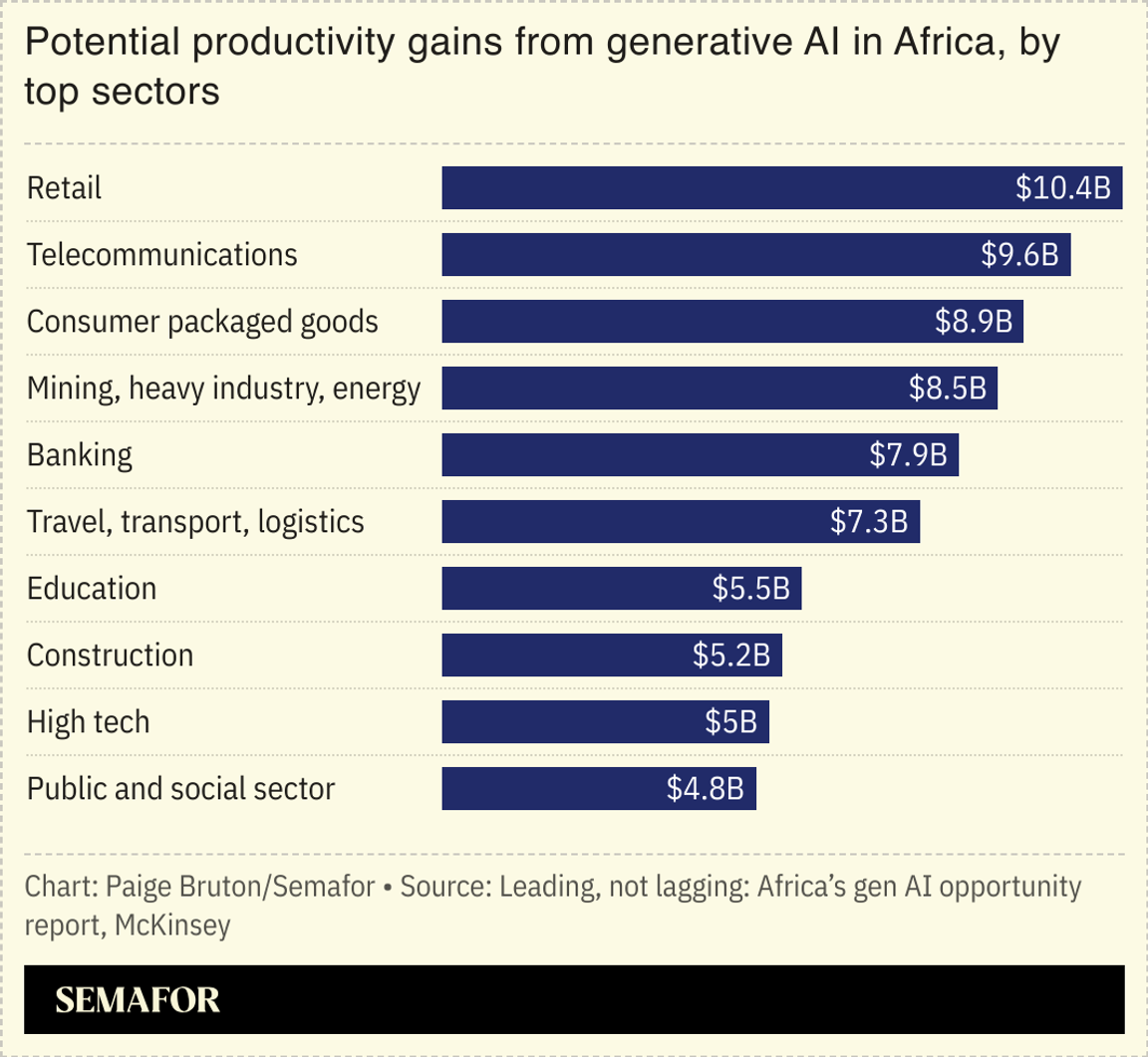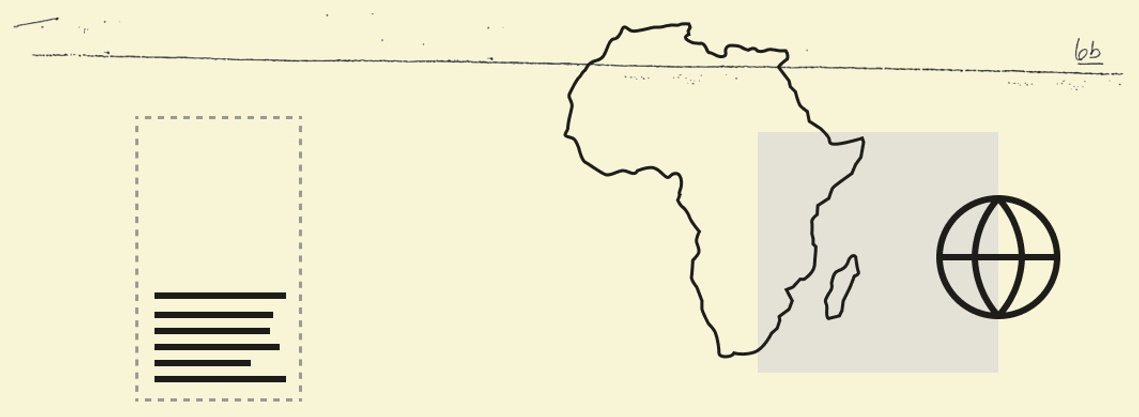| | In this edition: Unleashing local capital, Africa’s gen AI potential, South Africa unemployment rise͏ ͏ ͏ ͏ ͏ ͏ |
| |  | Africa |  |
| |
|
 - Mobilizing local capital
- Gold rescues Ghana
- Danone bets on Nigeria
- Kenya plans to sell state firms
- Gen AI opportunity
- New sovereign wealth fund
- Joblessness in S. Africa
 A new chess tournament builds on the success of Nigeria’s Tunde Onakoya. |
|
 Bonjour! Two questions have stood out in my conversations with business leaders and policymakers here in Abidjan at the Africa CEO Forum. The first has been some version of “What the heck is going on in the US?” The other has focused on the future of the African Development Bank, which is headquartered here. With just two weeks until the election of a new president to replace Akinwumi Adesina after his two terms, the intense lobbying, geopolitical dealmaking, and air miles have picked up pace. Five candidates are in the running: Amadou Hott (Senegal), Samuel Maimbo (Zambia), Sidi Ould Tah (Mauritania), Abbas Tolli (Chad), and Swazi Tshabalala (South Africa). The candidates I met with all expressed confidence that they would get enough votes from the bank’s shareholders. But behind the vote-seeking smiles and glad-handing, there is palpable tension as they get closer to winning or losing out on one of the continent’s most influential roles. That tension seemed to break out into the open on the final day of the conference, when the organizers had to abruptly cancel the much-anticipated debate between four of the leading candidates. While logistical difficulties was the catch-all explanation, Alexis and I also heard grumblings around personalities and the terms of the debate. Either way, this will all get resolved for real on May 29 and we will be reporting on it for you. |
|
| | Alexis Akwagyiram and Yinka Adegoke |
| |
 Sodiq Adelakun/Reuters Sodiq Adelakun/ReutersAfrican policymakers and bankers are exploring ways to unlock trillions of dollars tied up in the continent’s institutional funds to build infrastructure. The topic was a recurring talking point during this week’s Africa CEO Forum in Abidjan, amid growing uncertainty around international investment caused by erratic US trade policies. In areas such as infrastructure, Africa is estimated to have a $100 billion-a-year funding gap. Analysts say one way to bridge that shortfall would be to unlock a larger portion of African institutional investments — such as pension funds — which have been concentrated in more conservative assets such as fixed income and treasury bills. “There is about $4 trillion in Africa, mostly in banks, pension funds and foreign reserves,” Samaila Zubairu, CEO of the Africa Finance Corporation, a Lagos-based multilateral lender, told Semafor, citing research by his institution. “The issue is, how we get it to flow into projects.” He said AFC, which specializes in infrastructure development, is in talks with authorities in Angola, Botswana, and Kenya to replicate InfraCredit, a Nigerian credit institution that supports pension fund investments by providing guarantees on local currency debt. |
|
 Ghana President John Dramani Mahama. Courtesy of Chatham House. Ghana President John Dramani Mahama. Courtesy of Chatham House.Ghana’s gold and cocoa exports have protected the country’s economy from the global fall in oil prices, President John Dramani Mahama said. Crude, the nation’s second-largest export, has plunged in value since US President Donald Trump took office in January. Mahama, speaking at the Africa CEO Forum in Abidjan, said Ghana had benefited from being “a bit more diversified than other countries,” thanks to its main exports of gold, oil, and cocoa. In particular, gold, the country’s biggest export, had insulated the economy. “When the world gets unpredictable, one commodity increases in price: Gold. There’s gold everywhere in Ghana,” he said. — Alexis |
|
Danone doubles down on Nigeria |
 Stephanie Lecocq/File Photo/Reuters Stephanie Lecocq/File Photo/ReutersFrench food giant Danone is doubling down on its plans to invest in Nigeria, even as other multinationals have pulled out of the continent’s largest consumer market in the last two years. “We are convinced about the potential of Nigeria,” Christian Stammkoetter, Danone’s head of Asia, Middle East, and Africa, told Semafor on the sidelines of the Africa CEO Forum in Abidjan. Procter & Gamble, GSK, and Unilever, are among the multinationals that have either severely cut back their presence in Nigeria or pulled out, typically citing currency devaluations and rampant inflation after President Bola Tinubu’s administration applied tough economic policies soon after coming to office nearly two years ago. But Danone has long been operating in Nigeria, where it is best known for its Fan Milk brand, and recently invested in developing milk distribution capacity in the country’s north to help lower operational costs. Stammkoetter said the company will “continue doubling down through innovation and expansion of its routes to market.” — Yinka |
|
Kenya plans state-firms sale |
 Yasuyoshi Chiba/AFP via Getty Images Yasuyoshi Chiba/AFP via Getty ImagesKenya’s National Treasury laid out plans to raise $1.15 billion from the sale of state-owned enterprises to reduce the government’s growing debt burden. Eleven firms have been proposed for initial sale including the Kenya Pipeline Company, the Kenyatta International Convention Center, and New KCC, the oldest dairy processor in east and central Africa. Albert Mwenda, a director-general at the Kenyan Treasury, said a court process has delayed the privatization program, but the government plans to channel earnings from sales to pay-off suppliers and reform agencies. The move comes as Nairobi tries to balance the 2025-26 budget at a time of soaring public resistance to higher taxes. Some 35 other companies in which the government owns stakes, such as the telecom major Safaricom, could also see those holdings put up for sale, according to local media. |
|
Africa’s gen AI potential |
 Africa’s economies could unlock up to $103 billion in annual value if they deployed generative artificial intelligence at scale, said consultancy firm McKinsey. It estimates that more than 40% of African institutions have either experimented with or implemented generative AI solutions, pointing to Kenya’s personalized educational curricula and South African models for small business owners to better understand finances. The continent’s retail sector has the highest potential for unlocking economic value with the aid of generative AI, McKinsey projected, followed by sectors including travel and logistics, education, and construction. But realizing this potential will require filling many gaps on the continent, from limited infrastructure and expertise to uncertainty around regulation. “Strong gen AI ecosystems are built on robust infrastructure including reliable power, high-performance computing, and regional cloud resources,” the report authors said. — Alexander Onukwue |
|
Eswatini’s new sovereign wealth fund |
 Eswatini Tourism/X via Wikimedia Commons Eswatini Tourism/X via Wikimedia CommonsThe southern African kingdom of Eswatini is planning to raise a $275 million sovereign wealth fund. The landlocked nation relied on USAID for a fifth of its overseas assistance, a recent Center for Global Development analysis noted, and has been hard hit by sweeping cuts at the US agency this year. Legislation for the new fund is likely to be finalized within the next three months, Eswatini’s finance minister told Bloomberg, with the aim that it helps direct money into sectors such as agriculture and manufacturing. |
|
S. Africa unemployment rises |
 South Africa’s unemployment rate in the first quarter of this year, one of the highest in the world. The latest figure marks a rise from the 31.9% rate registered in the final quarter of 2024. Most jobs were lost in the trade and construction industries, while the transport and finance sectors recorded the most hires. More people of working age are discouraged about finding work, Statistics South Africa noted. |
|
 Business & Macro |
|
|